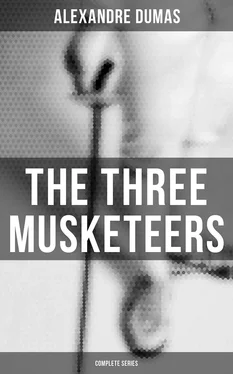“I shall entertain, whatever may happen,” said d’Artagnan, placing his hand upon his breast and bowing, “an eternal gratitude toward your Eminence for that which you now do for me.”
“Well, let it be, then, as you have said, Monsieur d’Artagnan; we shall see each other again after the campaign. I will have my eye upon you, for I shall be there,” replied the cardinal, pointing with his finger to a magnificent suit of armor he was to wear, “and on our return, well—we will settle our account!”
“Young man,” said Richelieu, “if I shall be able to say to you at another time what I have said to you today, I promise you to do so.”
This last expression of Richelieu’s conveyed a terrible doubt; it alarmed d’Artagnan more than a menace would have done, for it was a warning. The cardinal, then, was seeking to preserve him from some misfortune which threatened him. He opened his mouth to reply, but with a haughty gesture the cardinal dismissed him.
D’Artagnan went out, but at the door his heart almost failed him, and he felt inclined to return. Then the noble and severe countenance of Athos crossed his mind; if he made the compact with the cardinal which he required, Athos would no more give him his hand—Athos would renounce him.
It was this fear that restrained him, so powerful is the influence of a truly great character on all that surrounds it.
D’Artagnan descended by the staircase at which he had entered, and found Athos and the four Musketeers waiting his appearance, and beginning to grow uneasy. With a word, d’Artagnan reassured them; and Planchet ran to inform the other sentinels that it was useless to keep guard longer, as his master had come out safe from the Palais-Cardinal.
Returned home with Athos, Aramis and Porthos inquired eagerly the cause of the strange interview; but d’Artagnan confined himself to telling them that M. de Richelieu had sent for him to propose to him to enter into his guards with the rank of ensign, and that he had refused.
“And you were right,” cried Aramis and Porthos, with one voice.
Athos fell into a profound reverie and answered nothing. But when they were alone he said, “You have done that which you ought to have done, d’Artagnan; but perhaps you have been wrong.”
D’Artagnan sighed deeply, for this voice responded to a secret voice of his soul, which told him that great misfortunes awaited him.
The whole of the next day was spent in preparations for departure. D’Artagnan went to take leave of M. de Treville. At that time it was believed that the separation of the Musketeers and the Guards would be but momentary, the king holding his Parliament that very day and proposing to set out the day after. M. de Treville contented himself with asking d’Artagnan if he could do anything for him, but d’Artagnan answered that he was supplied with all he wanted.
That night brought together all those comrades of the Guards of M. Dessessart and the company of Musketeers of M. de Treville who had been accustomed to associate together. They were parting to meet again when it pleased God, and if it pleased God. That night, then, was somewhat riotous, as may be imagined. In such cases extreme preoccupation is only to be combated by extreme carelessness.
At the first sound of the morning trumpet the friends separated; the Musketeers hastening to the hotel of M. de Treville, the Guards to that of M. Dessessart. Each of the captains then led his company to the Louvre, where the king held his review.
The king was dull and appeared ill, which detracted a little from his usual lofty bearing. In fact, the evening before, a fever had seized him in the midst of the Parliament, while he was holding his Bed of Justice. He had, not the less, decided upon setting out that same evening; and in spite of the remonstrances that had been offered to him, he persisted in having the review, hoping by setting it at defiance to conquer the disease which began to lay hold upon him.
The review over, the Guards set forward alone on their march, the Musketeers waiting for the king, which allowed Porthos time to go and take a turn in his superb equipment in the Rue aux Ours.
The procurator’s wife saw him pass in his new uniform and on his fine horse. She loved Porthos too dearly to allow him to part thus; she made him a sign to dismount and come to her. Porthos was magnificent; his spurs jingled, his cuirass glittered, his sword knocked proudly against his ample limbs. This time the clerks evinced no inclination to laugh, such a real ear clipper did Porthos appear.
The Musketeer was introduced to M. Coquenard, whose little gray eyes sparkled with anger at seeing his cousin all blazing new. Nevertheless, one thing afforded him inward consolation; it was expected by everybody that the campaign would be a severe one. He whispered a hope to himself that this beloved relative might be killed in the field.
Porthos paid his compliments to M. Coquenard and bade him farewell. M. Coquenard wished him all sorts of prosperities. As to Mme. Coquenard, she could not restrain her tears; but no evil impressions were taken from her grief as she was known to be very much attached to her relatives, about whom she was constantly having serious disputes with her husband.
But the real adieux were made in Mme. Coquenard’s chamber; they were heartrending.
As long as the procurator’s wife could follow him with her eyes, she waved her handkerchief to him, leaning so far out of the window as to lead people to believe she wished to precipitate herself. Porthos received all these attentions like a man accustomed to such demonstrations, only on turning the corner of the street he lifted his hat gracefully, and waved it to her as a sign of adieu.
On his part Aramis wrote a long letter. To whom? Nobody knew. Kitty, who was to set out that evening for Tours, was waiting in the next chamber.
Athos sipped the last bottle of his Spanish wine.
In the meantime d’Artagnan was defiling with his company. Arriving at the Faubourg St. Antoine, he turned round to look gaily at the Bastille; but as it was the Bastille alone he looked at, he did not observe Milady, who, mounted upon a light chestnut horse, designated him with her finger to two ill-looking men who came close up to the ranks to take notice of him. To a look of interrogation which they made, Milady replied by a sign that it was he. Then, certain that there could be no mistake in the execution of her orders, she started her horse and disappeared.
The two men followed the company, and on leaving the Faubourg St. Antoine, mounted two horses properly equipped, which a servant without livery had waiting for them.
Chapter 41
The Siege of La Rochelle
Table of Contents
The Siege of La Rochelle was one of the great political events of the reign of Louis XIII, and one of the great military enterprises of the cardinal. It is, then, interesting and even necessary that we should say a few words about it, particularly as many details of this siege are connected in too important a manner with the story we have undertaken to relate to allow us to pass it over in silence.
The political plans of the cardinal when he undertook this siege were extensive. Let us unfold them first, and then pass on to the private plans which perhaps had not less influence upon his Eminence than the others.
Of the important cities given up by Henry IV to the Huguenots as places of safety, there only remained La Rochelle. It became necessary, therefore, to destroy this last bulwark of Calvinism—a dangerous leaven with which the ferments of civil revolt and foreign war were constantly mingling.
Spaniards, Englishmen, and Italian malcontents, adventurers of all nations, and soldiers of fortune of every sect, flocked at the first summons under the standard of the Protestants, and organized themselves like a vast association, whose branches diverged freely over all parts of Europe.
Читать дальше












